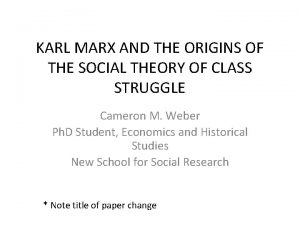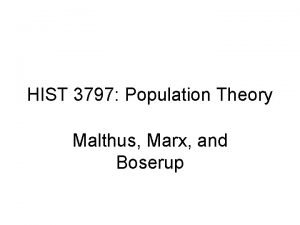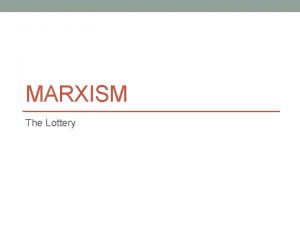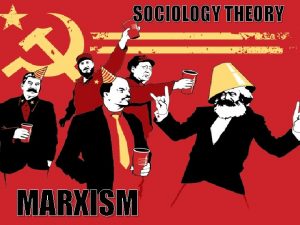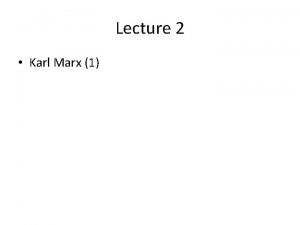Sociological Approaches to Education Marxism Karl Marx Marxism








- Slides: 8

Sociological Approaches to Education Marxism Karl Marx

Marxism Developed by Karl Marx in the 19 th century n Marx and Engels wrote the famous “Communist Manifesto” in 1846 n Marx developed the political system known as Communism n

Marxism n n n When considering Marxist theory it is useful to remember the 3 Cs; Class Conflict Capitalism These provide a “baseline” to Marxist theory

Class -the basis of Marxist theory n n Marx was concerned by the inequalities between social classes A very small proportion of wealthy people owned huge amounts of land factories Marx called these people the BOURGEOISIE and the land or factories they owned the MEANS OF PRODUCTION Most of the people worked for the Bourgeoisie as waged labourers

The basis of Marxist theory These waged labourers were named the PROLETARIAT and were exploited, claimed Marx, by the bourgeoisie as they earned only enough money to survive. n All the Proletariat owned was their labour and thus had no control over their working lives and no share in the profits n Factory production lines meant they became “alienated” from their craft n

Class, conflict and capitalism n n n n The differences between the bourgeoisie and the proletariat demonstrate a wide class division. According to Marx, the interests of the bourgeoisie or ruling class were protected and promoted. The ensuing social inequalities caused conflict in society. Capitalism also causes conflict of interest between the classes. The need for the bourgeoisie to make profits is in conflict with the need of the proletariat to earn enough money to have decent living standards. Profits certainly came first during the Industrial Revolution. The bourgeoisie became extremely wealthy while the proletariat worked long hours for little pay and lived in squalor.

How does Education fit in with Marxism? n n n Why did the proletariat put up with these harsh and unfair conditions? Marx believed the proletariat existed in a state of FALSE CLASS CONSCIOUSNESS – they accepted their life and situation as inevitable Capitalist Ideology, gave legal protection to the bougeoisie and taught the proletariat that powerful members of society deserved respect This is described as Hegemony – the dominant culture based on a set of fixed beliefs How was this ideology transmitted? Through institutions such as Religion, Government, Family and EDUCATION

Is Marxism still relevant? Marx was describing a society 150 years ago but modern Marxists believe his ideas to be broadly true n Social classes are not as sharply divided now but harsh inequalities remain n Modern Marxists believe that the education system is one of the main agents of control, depriving working class children of opportunities to improve their situation n





